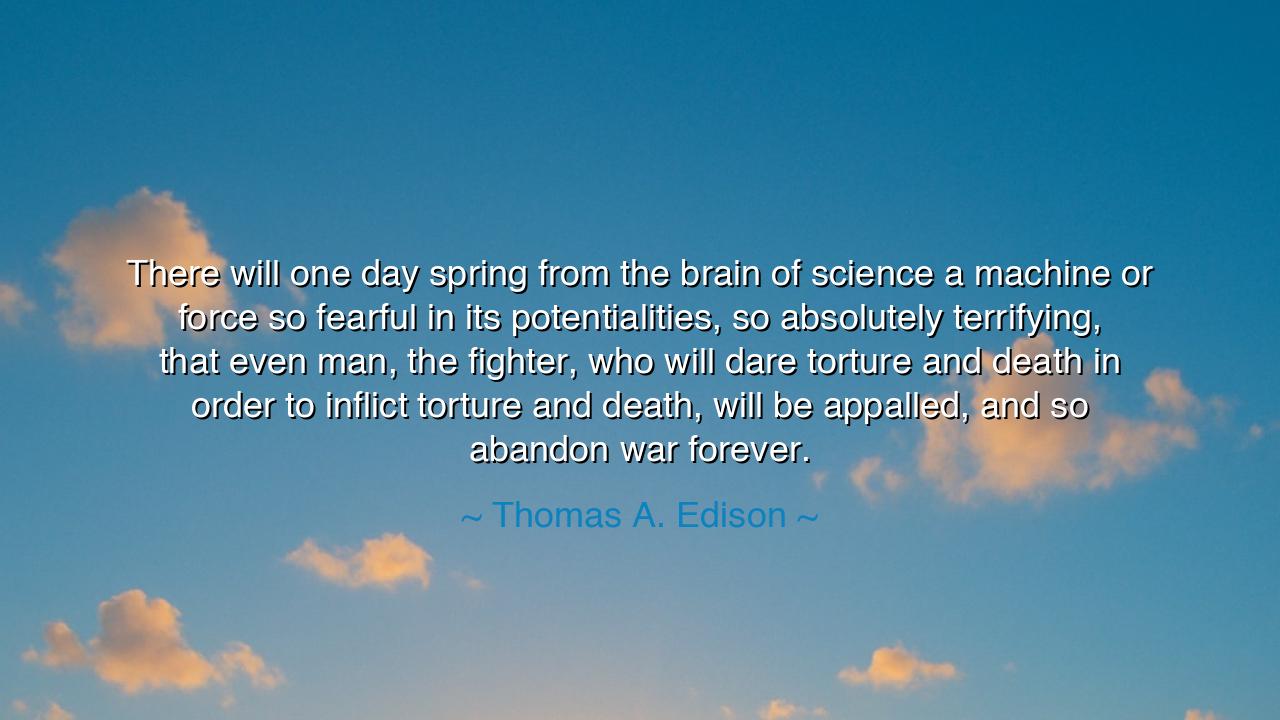
There will one day spring from the brain of science a machine or
There will one day spring from the brain of science a machine or force so fearful in its potentialities, so absolutely terrifying, that even man, the fighter, who will dare torture and death in order to inflict torture and death, will be appalled, and so abandon war forever.






The words of Thomas A. Edison, “There will one day spring from the brain of science a machine or force so fearful in its potentialities, so absolutely terrifying, that even man, the fighter, who will dare torture and death in order to inflict torture and death, will be appalled, and so abandon war forever,” sound like a prophecy—one spoken not from cold intellect, but from the trembling heart of foresight. In these words, Edison peers beyond his own century and into the shadowed horizon of the future. He foresees a time when the genius of science, which had lifted mankind from darkness into light, would also forge a power so dreadful that it would shake the warrior’s heart and make even the bravest tremble. And in that terror, he hoped, humanity might finally find peace.
Edison, the great inventor, was a man of boundless faith in human progress. His mind birthed the light bulb, the phonograph, the motion picture camera—machines that reshaped the world and brought illumination, art, and knowledge to the common soul. Yet, even he, the eternal optimist of innovation, understood that every force of creation carries within it the seed of destruction. He saw that the hand that builds may also break, and that the brain of science, noble though it is, can be twisted by the heart of man, which is still ruled by ambition, envy, and pride. His words were a warning—and a prayer—that one day the very horror of human invention would awaken humanity’s conscience.
Indeed, his vision came to pass in ways more terrible than even he might have imagined. In the middle of the twentieth century, from the genius of physicists and the laboratories of nations, there arose the atomic bomb—a weapon that contained within it the fire of the sun. When it fell upon Hiroshima and Nagasaki, the world watched cities vanish in light and ashes. The machine Edison foretold had been born, and its power was as fearful and as absolutely terrifying as he had described. And for the first time in history, mankind stood appalled before the work of its own hands. The same mind that had unlocked the atom’s mystery now shuddered at its consequences.
In those days after the bomb, some believed that Edison's prophecy might at last be fulfilled—that man, seeing the horror he had wrought, would abandon war forever. But though fear did indeed strike deeply, peace did not yet come. The nations continued to arm themselves with weapons of unimaginable force, each guarding its power behind walls of suspicion. The dream that terror might teach peace was not enough, for fear restrains the hand, but only wisdom transforms the heart. Edison's hope revealed a truth eternal: no machine, no matter how dreadful, can alone change the soul of man. Only moral awakening can do that.
And yet, his words still shine with purpose. For Edison understood something profound—that progress without conscience is peril, and knowledge without compassion is ruin. He spoke not against science, but for its union with ethics, its partnership with mercy. He believed that human invention should serve life, not threaten it; that the light of discovery must always be tempered by the light of conscience. His prophecy was a call to all generations: that each time we create something powerful, we must also create within ourselves the wisdom to wield it rightly.
History has shown us both the folly and the promise of his words. From the Cold War to the present age of machines that think, man continues to stand upon the edge of his own creations, staring into their depths with both awe and dread. Each age produces new marvels—nuclear power, artificial intelligence, genetic engineering—forces that can heal or destroy, depending upon the heart that guides them. Edison’s warning lives on: that unless we learn humility before our own inventions, the machine meant to end war may only create new wars of the mind and spirit.
The lesson, therefore, is clear: technology alone will never save humanity—only humanity can save itself. Let our science be guided by compassion, our innovation governed by wisdom, and our power restrained by moral strength. Teach the young not only how to build, but why to build—and for whom. Let every discovery be weighed not merely by what it can do, but by what it may undo. For the day man weds wisdom to power will be the day Edison's prophecy finds its truest fulfillment—not through terror, but through enlightenment.
So remember, children of the future: the mind can create wonders, but only the heart can create peace. Edison’s vision was not a dream of destruction, but of redemption—that from the fear of death, life might be cherished; from the shadow of war, compassion might arise. If mankind listens, if it learns, then perhaps one day, through understanding and unity, humanity will indeed lay down its weapons—not because it is frightened, but because it has finally become wise.






AAdministratorAdministrator
Welcome, honored guests. Please leave a comment, we will respond soon